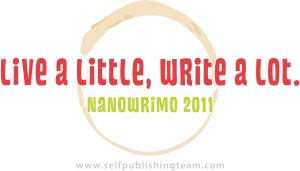Well, my lovely Duoliters (Duolitians? Duolettes? Duolitites?) it’s that time of year again. The dawn of a new year is nearly upon us, which brings with it the time honored tradition of New Year’s Resolutions.
 In 2012, we want to make sure that among your goals for weight loss (this year will be different, really, that thigh master is coming out of the garage and it’s gonna be on like Donkey Kong!), financial security (no more impulse buys, that piggy bank is going to be brimming with gold by year’s end!) and spiritual growth (you will tune in less to the TV and more to the world around you!) we also want you to add some attainable goals for your writing development.
In 2012, we want to make sure that among your goals for weight loss (this year will be different, really, that thigh master is coming out of the garage and it’s gonna be on like Donkey Kong!), financial security (no more impulse buys, that piggy bank is going to be brimming with gold by year’s end!) and spiritual growth (you will tune in less to the TV and more to the world around you!) we also want you to add some attainable goals for your writing development.
But wait! First we have to evaluate our 2011 goals.
If you’ve been keeping up with our monthly writing motivation newsletters this year or if you’ve taken our How NOT to Write a Book eCourse, you should already have set some writing goals for yourself in 2011. Before we can take a look ahead at 2012 (which we will do in a follow-up blog in January) we have to take an inventory of where you stand based on the results of 2011. So without further ado, let’s get to it.
1. The positives: What did you accomplish?
Every Duolit meeting begins on a positive note, which typically involves some sort of delicious, junky type food and equally junky discussion on celebrity gossip or news. Along the same lines, we want to begin your evaluation by taking a look at the positives of 2011 in terms of your writing goals. What were you able to achieve? Did you participate in NaNoWriMo? Create an outline for your book? Write a first draft? Edit a second draft? If you surpassed any of the marks you set for yourself in your writing, take a minute to stop and give yourself a big pat on the back. Finding the time and energy to take those steps ain’t easy, so your progress should be celebrated with glee.Continue Reading
 We’re a little over a week into
We’re a little over a week into  Self-published works are not subjected to the watchful eyes of professional editors, leaving the job of proofreading in the hands of the writer. To create self-published works that look great and convey your ideas appropriately, follow these 10 proofreading tips from professional proofreaders:
Self-published works are not subjected to the watchful eyes of professional editors, leaving the job of proofreading in the hands of the writer. To create self-published works that look great and convey your ideas appropriately, follow these 10 proofreading tips from professional proofreaders:
 We're
We're 








